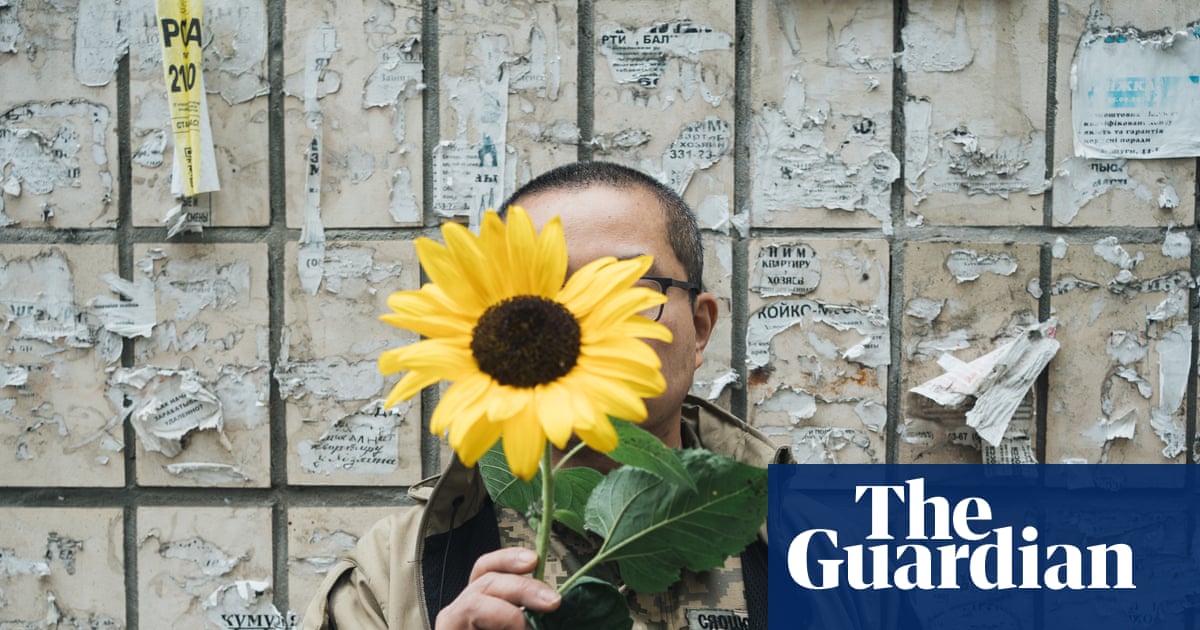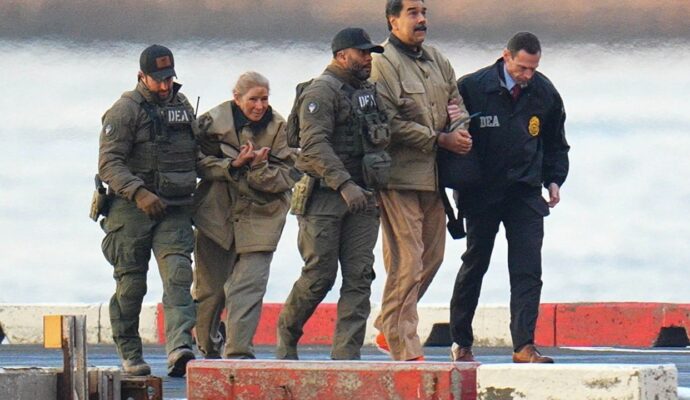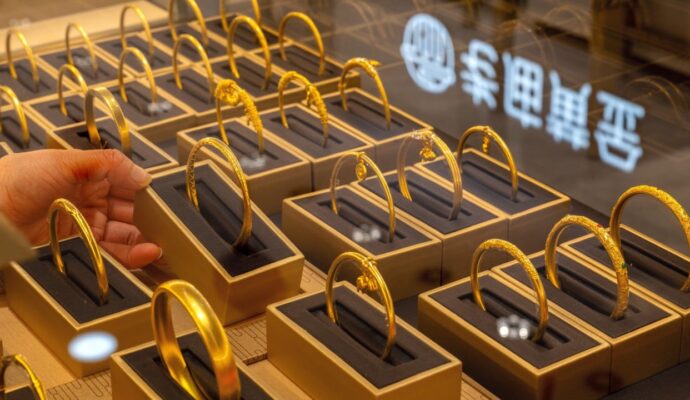
In a war that has been characterised by merciless attacks on civilians, one of the worst took place on 8 July 2024. Russia missile strikes killed at least 43 people in cities across Ukraine in one of the deadliest days of the war last year. One of the most shocking blows was to the Okhmatdyt children’s hospital in central Kyiv, which reduced the country’s largest paediatric clinic to rubble.
Tim, 43, was delivering aid on the outskirts of Kyiv when he heard a missile fly overhead. A short while later, he saw the news on his phone that the children’s hospital had been hit. Along with a British friend, the Chinese national, who asked to be referred to by just his English name, rushed to the scene to help with the recovery efforts. “Seeing the severed limbs, some of them belonging to children, I started crying,” the father-of-two said, tears in his eyes at the memory. “I thought about the kind of anger that Chinese people have. Once it’s ignited … It’s intense. I decided to join the army.”
More than a year later, Tim is in his barracks in southern Ukraine, engineering drones for the military’s ground force. He is one of a small number of Chinese people who have defied their government and mainstream public opinion to risk their lives to fight against an invasion by Beijing’s most important geopolitical partner, Russia.
Tim arrived in Ukraine in July 2023. He had been watching with concern from China for months, occasionally donating money to online fundraisers for relief efforts. But he wanted to do more. “At that time, I was unemployed in China. I just wanted to go to Ukraine as a volunteer – to see a country suffering through hardship and deliver the donations that many of my close friends had given me to help the people who needed them.” So he applied for a business visa through an agent in China and embarked on the long journey west.
Like many Chinese volunteers, Tim is motivated by a combination of sympathy for the Ukrainian cause and increasing despair at the direction of his own country. Before he arrived in Ukraine, the only country he had visited outside of China was Japan. But he’d considered emigrating for over a decade.
“Fifteen years ago, you could see problems, speak freely about them, and there would be people willing to discuss them,” Tim said of China. But those days are gone, he feels. He learned about the war in Ukraine by using a virtual private network (VPN) connection to watch videos on YouTube, which is blocked in China. “I don’t read news from Chinese websites at all … because the news there is all fake,” he said.
He went back and forth between Ukraine and China for a year, each time taking long and indirect routes that involved several stopovers, and gradually cameto the conclusion thatUkraine had a “bright future”. Despite being at war, people were friendly to him as a foreigner. He started making plans for his wife and children to join him, and then the missile attack on the children’s hospital spurred him to enlist in the army.
Foreigners can serve in in regular Ukrainian army units or one of two dedicated international legions. Kostyantyn Milevsky, a Ukrainian military official, said in August that there were about 8,000 foreigners in the land forces, and perhaps double that figure across the military as a whole. The Ukrainian army does not release detailed breakdowns of the nationalities of international recruitsbut many come from South America drawn by salaries that can exceed $3,000 (£2,244) a month for the most dangerous missions. The basic income is closer to $500 a month. Chinese volunteers in Ukraine estimate that there are at most a few dozen people from mainland China serving in the army.
The Chinese public’s views on Russia are complex. Some nationalists have never forgiven tsarist Russia for annexing large swathes of territory from the Qing dynasty in the late 19th century, but the war in Ukraine has been accompanied in China by an aggressive propaganda push from state media, which blames the US for the crisis.
Beijing officially claims to be neutral in the conflict and has called for peace. But the Chinese president, Xi Jinping, has stood by his Russian counterpart,Vladimir Putin, throughout the war, and western analysts believe it would be very difficult for Moscow to continue fighting without China’s economic support. Bilateral trade between the two countries has surged to record levels since the 2022 invasion. China is not thought to be providing direct military aid, but exports of components used to make weapons, such as fibre optic cables, have increased sharply. Components are also shipped to Ukraine, but at much lower levels.
Research by Tao Wang of the University of Manchester found 80% of Chinese people surveyed held pro-Russia views in the first year of the war, and that “government-controlled media succeeded in swaying public opinion in favour of Russia” as it progressed.
But there is a “sizeable portion of the Chinese population sympathetic to Ukraine that has been largely overlooked,” Wang said. People are often afraid to express such views explicitly because it is “viewed as unconventional”.
It is not just ideology that draws people such as Tim, an unemployed car mechanic when he left China in 2023, to the frontline. China is in the grip of an unemployment crisis which has spurred dissatisfaction with the government.
Another Chinese volunteer, Fan, whose first name the Guardian has withheld to protect his identity, also came to Ukraine to escape what seemed like a hopeless future back home.
Until he left China earlier this year, the 39-year-old’s life in China was just about “lying flat”, he said, using a Chinese expression for passive unemployment. The pandemic had destroyed his business ventures and he had fallen into debt to the tune of 3m yuan (£314,000).
Browsing on western social media one day, he read about Chinese people fighting in Ukraine. He learned about Peng Chenliang, a Chinese volunteer from Yunnan province who served in the foreign legion and was killed in November 2024 during a combat operation on the eastern front.
“I was basically doing nothing back home … I felt I couldn’t go on living such an unremarkable life,” Fan said. He wanted to “do something that felt more meaningful”.
Chinese social media is awash with videos selling the benefits of becoming a mercenary for Russia. After two Chinese nationals were captured fighting for Moscow in eastern Donetsk in April, Ukraine’s president, Volodymyr Zelenskyy, said more than 150 others were doing so. There is no indication that China, which denies providing military aid to Russia, endorses these mercenaries, but it allows the videos to spread on the country’s tightly controlled internet.
Finding information about how to fight for Ukraine is much harder, so Fan asked ChatGPT. Eventually he found his way to a recruitment office in Lviv, leaving his wife and daughter behind in China. With no military experience but a hobby of playing with drones, he was assigned as a drone operator on the frontline in eastern Ukraine, but the language barrier led to him being pulled back from the combat zone. Now he spends his days guarding a warehouse. “It can be a bit lonely,” he said. But he passes the time by practising his Ukrainian on his phone.
Fan is not an overtly political person. But still he felt the tightening noose of China’s crackdown on civil society, especially since the pandemic. As well as struggling economically, he said he had seen many of his favourite bloggers persecuted or detained under charges such as “picking quarrels and provoking trouble” – a catch-all term used to target anyone who displeases the authorities. “Many ordinary people, just by expressing views in live streams or on their personal platforms that don’t align with mainstream opinion in China, ended up being treated unfairly,” he said.
“I am nearly 40, and I have not voted once in my life … the government never listens to the voices of ordinary people. I don’t want my kid to grow up in such an environment.”
Fan has not yet figured out how to bring the rest of his family to Ukraine, but returning to China could be dangerous. Chinese law does not specifically forbid citizens from joining foreign armies, unless it is a threat to Chinese national security, but many fear retribution. Another Chinese soldier in Ukraine, who asked to be referred to by his call sign, Brunko, said China’s national security police had questioned his family about him.
Tim sees his time in Ukraine as being in service of many goals. Asked why he would risk his life for another country, he said his main aim was to make a new life for himself and his family in Europe. “Secondly, I want to show the world that there are many Chinese people like me. I want the world not to give up on China,” he said. “Don’t always associate China with negative things. In fact, there are many good people in China and many positive ideas.”
Additional research by Lillian Yang and Jason Tzu Kuan Lu


